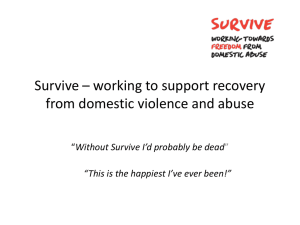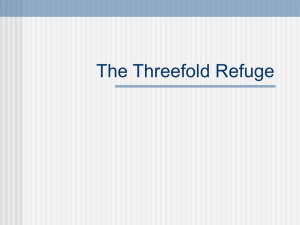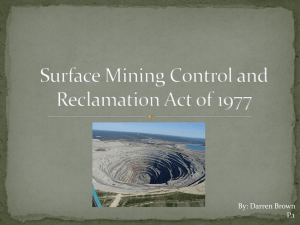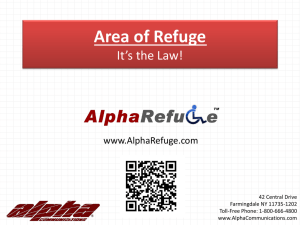MineARC Systems
advertisement
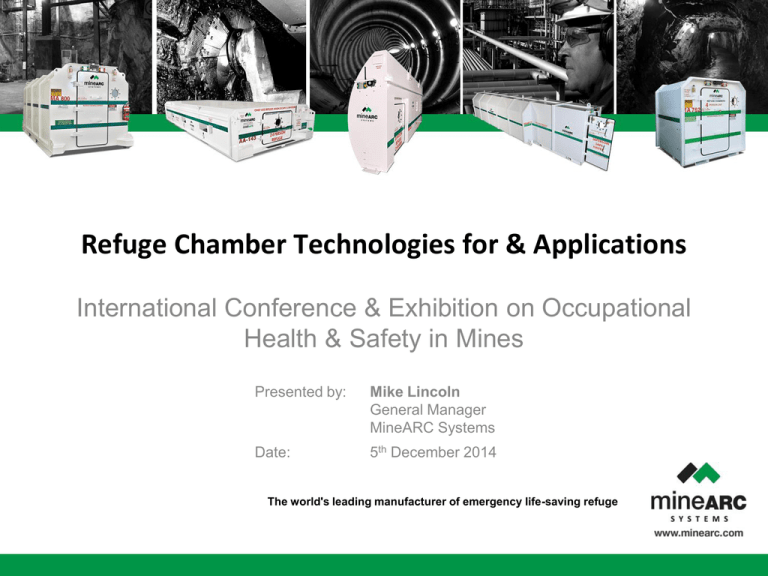
Refuge Chamber Technologies for & Applications International Conference & Exhibition on Occupational Health & Safety in Mines Presented by: Mike Lincoln General Manager MineARC Systems Date: 5th December 2014 The world's leading manufacturer of emergency life-saving refuge In This Presentation 1. MineARC Systems 9. Portable Refuge Components 2. Risks Associated with Entrapment 10. Products by Industry – Hard Rock Mining (HRM - ELVP) 3. Risks (Continued) 11. 4. Minimum Refuge Chamber Requirements Products by Industry – Hard Rock Mining (HRM Permanent) 5. Legislation or Industry Guidelines are Key 12. Permanent Refuge Installation Example 6. Products by Industry – Hard Rock Mining (HRM( 13. Products by Industry – Coal Mining 7. Hard Rock Mining Guideline 14. Legislation is key 8. Products by Industry Hard Rock Mining (HRM Series IV) 15. Products by Industry – Tunnelling The world's leading manufacturer of emergency life-saving refuge MineARC Systems The world’s leading manufacturer of emergency safe-refuge systems. Emergency refuge forms an integral part of an underground mine, tunnel or chemical operation’s wider Emergency Response Plan (ERP). Fires, explosions, rock-falls, flooding and the release of smoke and other forms of toxic gas are the types of industrial incidents that occur all too frequently. In these types of emergencies, when evacuation is no-longer safe or practical, emergency refuge is designed to provide a safe and secure ‘go-to’ area for personnel to gather and await extraction. The refuge must be capable of supporting life internally for sustained periods – operating in a fully-functioning standalone mode, independent of external services (air or power). MineARC refuges have been successfully used around the world in multiple mine and tunnelling emergencies to save lives www.minearc.com www.minearc.com Risks Associated with Entrapment 1. Compressed Air Failure • it is common for Victaulic couplings to fail during fires. Once this occurs, it is very likely too that smoke and carbon monoxide will be introduced into the chamber through that line – or perhaps that a vacuum will be formed in the chamber, which may draw those contaminants through any leaks in the system. Either way, oxygen is no longer being replenished, positive pressure will be lost and toxic gases will no longer be flushed from the refuge. The Risk: Oxygen levels must be maintained between 18.5% and 23%. Physical ability is diminished at levels between 11-18%. At 8-11% fainting will occur without warning. Risk of brain damage and death during extended exposure at levels below 11%. 2. Heat • Sources of heat within a portable refuge include ambient heat, electrical equipment, lights, exothermic chemical reactions from CO2 or CO removal chemicals and from the occupants themselves. • Did you know that each occupant produces 400btu (120 watts) of heat per hour? 20 persons = 8,000btu. Add to this humidity delivered through perspiration, breathing and compressed air - and the environment quickly becomes deadly. • A maximum apparent temperature (combination of ambient temperature and humidity) of 95°F (35°C) is established by MSHA, and generally accepted as a good rule of thumb. The Risk: As occupants are no longer able dissipate body heat, at temperatures above 95°F (35°C), a number of heat related illnesses and eventually death can occur. (continued next page) www.minearc.com Risks (Continued) 3. Carbon Dioxide (CO2 ) • Humans exhale 30-50 litres of CO2 per hour and as CO2 levels rise around them, breathing will also increase causing them to emit CO2 at an even higher rate, creating a “snow ball effect” to CO2 production. If CO2 is not removed from the refuge interior, gas levels will rise past the generally accepted level of 1%. The Risk: CO2 levels above 0.5% cause lung ventilation to increase by 5%. Symptoms of simple asphyxia occur above 2% concentration. At 5%, prolonged exposure may lead to unconsciousness and death. At 10%, unconsciousness and death generally occur in less than 60 seconds. 4. Carbon Monoxide (CO) • Carbon monoxide is introduced through failed air lines and also emitted by smokers within a chamber. How will you mitigate CO buildup once it has occurred, and the refuge is no longer being purged with compressed air? • Did you know that smokers store CO in their blood stream in the form of carboxyhemoglobin at 4-20% (versus 0.4 to 0.7% in non-smokers)? And that they endogenously produce CO in oxygenated environments? The Risk: Exposure at 35ppm causes headache and dizziness within 6-8 hours. At 100ppm volume slight headache will occur in 2-3 hours. At 400ppm, headache within 1-2 hours. Dizziness, nausea and convulsions within 45 minutes at 800ppm. At 2,000ppm, rapid onset of headache and dizziness. At 2,000ppm, death is inevitable within 2 hours. www.minearc.com Minimum Refuge Chamber Requirements As a standard Code of Practice, MineARC Systems suggests consideration of the following basic systems as a minimum to mitigate risks: • External Compressed Air Supply • Primary source of breathing air / life support used to replenish oxygen and flush toxic gases from within the refuge chamber. At a minimum, the air supply should be filtered and regulated to .09m 3 (3 CFM) per occupant, with ability to isolate the system during emergencies (ie: during air line failure). • Secondary Oxygen Supply • Medical grade oxygen cache, sized to provide O2 at a rate of minimum 0.5L per occupant, per minute, for engineered duration of refuge. A third source of breathable air is strongly recommended, in the form of a sodium chlorate O2 (oxygen) candle. • Carbon Dioxide Removal • The CO2 removal system must be capable of removing no less than 24L CO2 per person, per hour, for the engineered duration of the refuge, in order to maintain levels at less than 1%. • Carbon Monoxide Removal • The CO removal system must be capable of maintaining levels below the maximum exposure limit of 25ppm. • Cooling & Dehumidifying • A cooling system with nominal capacity of 130 watts per person is recommended to mitigate heat loads of occupants and additional heat sources, with the ability to dehumidify the chamber interior. • Atmospheric Monitoring • Ability to monitor levels of oxygen, carbon dioxide and carbon monoxide within the chamber is essential. It is also recommended that the system be capable of safely monitoring gases outside the chamber during emergency. www.minearc.com Legislation or Industry Guidelines are Key www.minearc.com Products by Industry – Hard Rock Mining (HRM) Standard HRM HRM-ELVP HRM PERM Series IV (Extra Low Voltage Portable) Permanent Refuge Chambers www.minearc.com Hard Rock Mining Guideline Hard Rock Mining Globally recognised as worlds best practice. Three Operating Configurations: Standby, Externally Supported, Standalone. • 36 Hours standalone with no external services. • Max distance: no miner more than 750m from refuge • Capacity mine personnel plus visitors. • 3 sources of breathable air, air-conditioning, communications, UPS battery back-up, air scrubbing system. • • • • Mines Inspectorate action. Mining personnel expect refuge. In mining Culture Australian companies have adopted in OS operations. Ex-Pats have requested as employment criteria. www.minearc.com Products by Industry - Hard Rock Mining (HRM Series IV) Standard Portable HRM Series IV • 8,12,16, 20, 26, 30 Person Capacity www.minearc.com Portable Refuge Components What’s On The Outside: Pressure Relief Valves Advantage: Airlock or Single Door Entry • Advantages: • Provides immediate, 100% sealing from smoke and toxins. • Airlock purged by compressed mine air connection or by backup reserve bank of compressed air cylinders. • Incorporates poly carbon viewing portal(s). • Can be closed and reopened multiple times without compromising seal - eliminating need for traditional sealing materials and allowing “late comers” to enter without issue. Provide overpressure protection inside chamber, while keeping contaminants out. Minimum operating pressure: .03psi Steel Structure Front • Steel structure provides optimum safety from smoke, fire and toxins. • Fully welded structure with 1/4” (6.4mm) steel plate pressed sections, 4” x 2” (100 x 50mm) channel support wraps, 6” x 2” (150 x 50mm) channel skid base • Forklift slots and lifting / towing eyes. • Painted internally with non toxic finish and externally with polyurethane enamel for durability. Miscellaneous: • Smoke piercing red and green LED warning strobes • Siren (112dB) • 20lb. ABC fire extinguisher. www.minearc.com Portable Refuge Components What’s On The Outside: • Mine Air Supply • 3-stage filter assembly • Auto drains for moisture removal • One-way check valve(see inset) • Internally mounted regulator, automuffler and emergency shut off valve. (see inset) Optional step-down transformer mounted and pre-wired for 220/240V, single phase power supplies. Split Air Conditioning System • Sized to manage heat load from occupants and additional sources. • Dehumidifies interior of refuge. • Maintains safe apparent temperature. • Operates on mains electrical power AND battery back-up. Rear Inset: Exterior mine air filter components. Battery Backup • 100% backup power supply in the event of mains power failure for engineered duration of refuge (ie: 36 hours). • Provides uninterrupted, full operation of air conditioning, gas monitoring, CO2/CO scrubbing system, emergency communications, lighting and siren. www.minearc.com Portable Refuge Components What’s On The Inside: Air Conditioning • Digital Gas Monitoring Cools and dehumidifies refuge interior (with heat option). See exterior view for full description. • Monitors oxygen, carbon dioxide and carbon monoxide both inside chamber and out. • Powered by mains electrical supply and/or UPS battery backup. Oxygen Supply • Medical grade oxygen cache • Sized to provide safe levels of breathing air for occupants, for engineered duration of refuge. • Includes medical grade O2 regulator for proper metering. • Back up oxygen supply (oxygen candle) also included. Scrubbing / Controller System Standard Interior Includes: • Fluorescent Lighting • Raised non-slip flooring. • Easy-to-follow Operating Instructions. • Emergency food, water, chemical toilet and psychology of entrapment kit. • Pre-wired antenna and sealable communications penetrations. Interior Seating • Marine grade cushioned seating with backrest and storage beneath. www.minearc.com • Maintains CO2 and CO at acceptable levels. • Simple 1-touch operation. • Powered by main power and battery back-up. • Provides 24/7 battery monitoring • 12-hour system self-test diagnostics • Diagnostics data logging, • System sleep mode protection • Remote systems monitoring. • Ability to add remote camera monitoring. Products by Industry – Hard Rock Mining (HRM ELVP) HRM-ELVP (Extra Low Voltage Portable) • Mine Inspectors recognized a issue . • Ideal for Development heading • Double battery bank • 4, 6, 8 Person Capacity • Built to same standard as HRM • Bogger Frame or IT Hitch options • Blast Resistant Options www.minearc.com Products by Industry – Hard Rock Mining (HRM PERM) HRM-PERM (Permanent Refuge Chambers) (Underground safety zones, rest, break (crib) areas) • Up to 500+ Person Capacity • Air lock and Vestibules • Using existing working to create room • Multiple units and drone scrubbers Engineered for accurate life support • Room size Floor and Volume • Internal Obstacles • Rock Temperature • Entrapment period • Number of persons www.minearc.com Permanent Refuge Installation Example Shown with optional equipment from MineARC Systems including airlock, battery backup, scrubber and air conditioner on bulkhead wall: Exterior Interior Bulkhead wall Battery backup (UPS) with A/C condenser atop. Airlock attached via bulkhead door frame assembly. www.minearc.com Scrubber with air conditioning system and compressed oxygen cylinders. Products by Industry – Coal Mining The CoalSAFE Coal Secure Area For Evacuation • 8, 12, 16, 20, 24 Standard Capacity • Intrinsically Safe (non-electrically powered) • Liquid CO2 • 96 hours Stand-Alone Duration • CO & CO2 scrubbing • Air-Conditioning • 3 x Air Supply • Real time Gas Monitoring • Air lock Option • The MARCis www.minearc.com Products by Industry – Coal Mining Standard Modular The CoalSAFE High Seam Low Seam Standard www.minearc.com Legislation is key Coal Mining USA MSHA (Mines Safety Health Administration) ‘Final Rule’ Globally recognised as worlds best practice in coal mining . • 96 hours standalone • Designed to withstand 15 PSI over pressure • Internal apparent temperature to not exceed 95°F • The breathable air sustains each person for 96 hours • Average internal carbon dioxide concentration to ≤ 1% • Shall provide refuge to accommodate all persons underground • Located within 1,000 ft from working areas • No more than 30 minutes walking distance in out-bys • Over-ruled West Virginian regulation (considered weak) • Adopted and modified by china as there standard www.minearc.com Products by Industry - Tunnelling • Used in road, rail, drainage , Tunnelling. • TBM (Tunnel Boring Machine) gantry mounted. • Drill & Blast model. • Cross-passage model • Custom design based on varied regulations • Varied entrapment durations including ITA compliant www.minearc.com Thank You. PenaMaden represents MineARC Systems in Turkey MineARC CHINA Room 209, Tower C, Fangheng International Center, NO. 6 Wangjing Futong Street, Chaoyang District Beijing - PR China 100102 ph: +86 10 8472 6488 / 8472 6508 fax: +86 10 8478 5769 email: info@minearc.com MineARC AFRICA 154 Saint Antonios Road, Muldersdrift 1739, Gauteng, South Africa ph: +351 91 616 7664 fax: +351 289 322 308 email: info@minearc.com MineARC SOUTH AMERICA Avda. El Salto N°4001 Oficina 142 A , Piso 14 Comuna de Huechuraba Santiago, Chile ph: +56 2 29644290 fax: +56 2 29644291 email: info@minearc.com MineARC NORTH AMERICA 4850 W. Ledbetter Drive Dallas Texas 75236 USA ph: +1 (214) 337 5100 fax: +1 (214) 337 5103 email: info@minearc.com MineARC EUROPE Level 3, 97 Jermyn St London, SW1Y 6JE United Kingdom ph: +44 0207 389 9053 email: info@minearc.com.au MineARC AUSTRALIA Unit 2, 274 Welshpool Road Welshpool, Perth ph: +61 (8) 9333 4966 fax: +61 (8) 9333 4900 email: info@minearc.com.au
